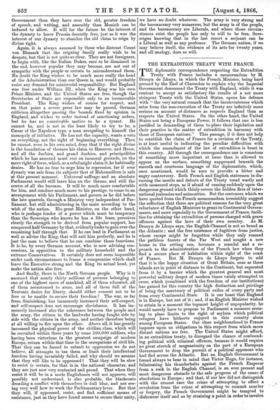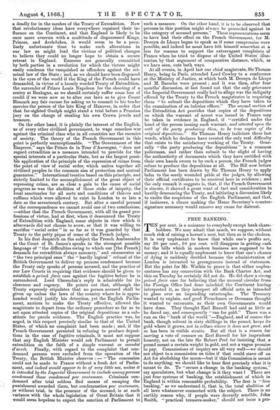THE EXTRADITION TREATY WITH FRANCE.
THE diplomatic correspondence respecting the Extradition Treaty with France includes a memorandum by M. Drouyn de Lhuys, in which the French Minister, being hard pressed by the Earl of Clarendon to explain why the Imperial Government denounced the Treaty with England, while it was content to accept as satisfactory the results of a not more stringent Treaty with the United States, opens his defence with "the very natural remark that the inconveniences which arise from the non-execution of the Treaty are infinitely more serious on account of distances as respects England than as respects the United States. On the other hand, the United States not being a European Power, it follows that one is less justified in demanding of them to place their legislation and their practice in the matter of extradition in harmony with those of European nations." This passage, if it does not help to establish the claim of France for a revision of the Treaty, is at least useful in indicating the peculiar difficulties with which the amendment of the law of extradition is beset in this country. All through the correspondence one is conscious of something more important at issue than is allowed to appear on the surface, something suppressed beneath the smooth and courteous language of the diplomatists, which, once mentioned, would be sure to provoke a bitter and angry controversy. Both French and English statesmen in dis- cussing the merits and defects of the Treaty tread warily and with measured steps, as if afraid of coming suddenly upon the dangerous ground which thinly covers the hidden fires of inter- national jealousies and animosities. But the sentences which we have quoted from the French memorandum irresistibly suggest the reflection that there are political reasons for the very great reluctance of English Ministers to grant to Continental Govern- ments, and more especially to the Government of France, facili- ties for obtaining the extradition of persons charged with grave offences against the laws of their own country. As M. Drouyn de Lhuys says, the English Channel is not so broad as the Atlantic ; and the free existence of fugitives from justice, whose escape might be forgotten while they only roamed the pathless forests of the Far West and sought a new home in the setting sun, becomes a scandal and a re- proach to the administration of the French law when they find a secure place of habitation within sight of the coast of France. But M. Drouyn de Lhuys forgets to add that it is the happy situation of Great Britain, near as these islands are in point of distance to the Continent, but separated from it by a barrier which the greatest general and most powerful military despot of modern times vainly attempted to cross, which (combined with the freedom of our institutions) has gained for this country the high distinction and privilege of being the sanctuary of political exiles of every party and from every Continental State. It is our boast that England is in Europe, but not of it ; and, if an English Minister wished to attain in a moment the topmost height of unpopularity, he would merely have to propose to Parliament a measure seem- ing to place limits to the right of asylum which political refugees have hitherto enjoyed in this country alone among European States. Our close neighbourhood to France imposes upon us obligations in this respect from which more distant nations are free. The United States might afford, in an extradition treaty, to disregard the chance of confound- ing political with criminal offences, because it would require no great stretch of magnanimity on the part of a European Government to drop the pursuit of a political opponent who had fled across the Atlantic. But an English Government is forced always to bear in mind that Victor Hugo, for instance, fulminating his thunderbolts against the French Emperor from a rock in the English Channel, is an ever present and most dangerous obstacle to the safe progress of the cause of absolutism in Europe ; and that, if our law did not distinguish with the utmost care the crime of attempting to effect a revolution from the crime of attempting to commit murder or forgery, the French Government might be tempted to dishonour itself and us by straining a point in order to involve a deadly foe in the meshes of the Treaty of Extradition. Now that revolutionary ideas have everywhere regained their in- fluence on the Continent, and that England is likely to be once more overrun with a multitude of dispossessed Kings, Princes, and Archdukes, it would seem to be a pecu- liarly unfortunate time to make such alterations in our law as might lead the victims of political changes to believe they could no longer hope to obtain a secure retreat in England. Excesses are generally committed by both parties in a revolution for which the victors might easily condemn the vanquished as offenders against the cri- minal law of the State ; and, as we should have been disgraced in the eyes of the world if the King of the French could have demanded, in virtue of a loosely worded Treaty of Extradition, the surrender of Prince Louis Napoleon for the shooting of a sentry at Boulogne, so we should certainly suffer some loss of credit if we were now so to alter our laws as to give Count Bismark any fair excuse for asking us to commit to his tender mercies the person of the late King of Hanover, in order that that far-sighted Guelph might stand a trial before a Prussian jury on the charge of stealing his own Crown jewels and treasure.
On the other hand, it is plainly the interest of the English, as of every other civilized government, to wage ceaseless war against the criminal class who in all countries are the enemies of society. The theory of the French Government in this point is perfectly unexceptionable. "The Government of the Emperor," says the Prince de la Tour d'Auvergne, "does not regard extradition as a measure intended to provide for the special interests of a particular State, but as the largest possi- ble application of the principle of the repression of crime from the point of view of social order, which unites together all civilized peoples in the common aim of protection and mutual guarantee." International treaties based on this principle, and strictly limited to the accomplishment of the great object of repressing crime, are as clear a gain to the cause of social progress as was the abolition of those sinks of iniquity, the local sanctuaries for all sorts and conditions of thieves and ruffians which were allowed to exist in London to so late a date as the seventeenth century. But after a careful perusal of the correspondence we cannot avoid one of two conclusions, —either that the French Government, with all its grand pro- fessions of virtue, had at first, when it denounced the Treaty of Extradition with England, some objects in view which it afterwards did not choose to avow, or that it was willing to sacrifice "social order" in so far as it was guarded by that Treaty to the petty pique of some of the French judges.
In his first despatch on the subject the French Ambassador at the Court of St. James's speaks in the strongest possible language of "the difficulties owing to which our [the French] demands for extradition always miscarry," and enumerates as "the two principal ones" the "hardly logical" refusal of the British Government to deliver up persons condemned because the Treaty only speaks of persons accused, and the practice of our Law Courts in requiring that evidence should be given to establish a prima' fade case against the fugitive before he is surrendered. Lord Clarendon's reply is admirable for its clearness and cogency. He points out that, although the Treaty expressly stipulates that no person accused shall be given up unless the laws of the country where he is appre- hended would justify his detention, yet the English Parlia- ment, anxious to make the Treaty effective, allowed the magistrate to depart from the ordinary procedure so far as to act upon attested copies of the original depositions as a sub- stitute for parole evidence. The English practice was, he urged, in this respect precisely similar to that of the United States, of which no complaint had been made ; and, if the French Government persisted in refusing to produce deposi- tions in the case of fugitive criminals, it must not suppose that any English Minister would ask Parliament to permit extradition on the faith of a simple warrant or mandat d'arrgt. Finally, with regard to the complaint that con- demned persons were excluded from the operation of the Treaty, the British Minister observes : — "The concession could not be made to France without a fresh Act of Parlia- ment, and indeed would appear to be of very little use, unless it is intended by the Imperial Government to include among persons condemned those condemned par contumace. Criminals con- demned after trial seldom find means of escaping the punishment awarded them, but condemnation par contumace, or without trial, in the presence of the accused, is at such variance with the whole legislation of Great Britain that it would seem hopeless to expect the sanction of Parliament to such a measure. On the other hand, it is to be observed that persons in this position might always be proceeded against in the category of accused persons." These representations seem to have had their effect on the French Government, for M.
Drouyn de Lhuys began to speak as if some compromise were possible, and indeed he must have felt himself somewhat at a
loss for reasons to support the extravagant complaints of France when he tried to dispose of the United States' illus- tration by that argument of comparative distance, which, as we have seen, cuts both ways.
At all events, in April last our chief magistrate, Sir Thomas Henry, being in Paris, attended Lord Cowley to a conference at the Mini 'try of Justice, at which both M. Drouyn de Lhuys and M. Baroche were present ; and it was then, after four months' discussion, at last found out that the only grievance the Imperial Government really had to allege was the indignity offered by the Treaty to the French magistrates in requiring them "to submit the depositions which they have taken to the examination of an inferior officer." The second section of the Extradition Act provides that copies of the depositions on which the warrant of arrest was issued in France may be taken in evidence in England, if "certified under the hand of the person issuing such warrant, and attested upon the oath of the party producing them, to be true copies of the original depositions." Sir Thomas Henry italicizes these last words, which he declares have created the only real difficulty that exists to the satisfactory working of the Treaty. Gene- rally "the party producing the depositions" is a common policeman, and rather than submit to the slight of having the authenticity of documents which they have certified with their own hands sworn to by such a person, the French judges refuse to produce the depositions at all. The Bill now before Parliament has been drawn by Sir Thomas Henry to apply balm to the sorely wounded pride of the judges, by allowing their official certificates to be received here in evidence ; and the only remark it suggests is, that, if the French Government is sincere, it showed a great want of tact and consideration in hastily denouncing the Treaty, and initiating a discussion likely to excite the suspicions of the English Parliament, and that, if insincere, a clause making the Home Secretary's counter- signature necessary would remove any cause for distrust.































 Previous page
Previous page